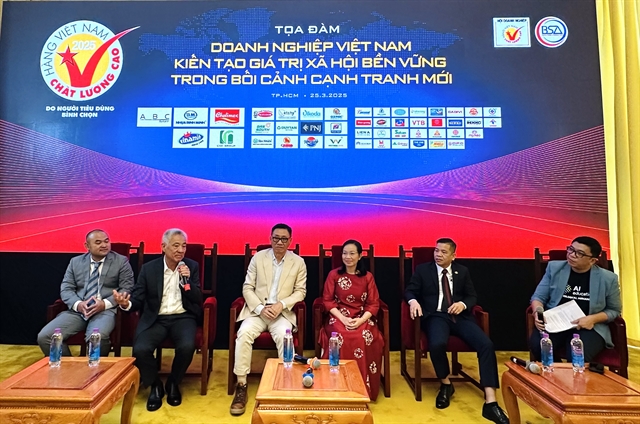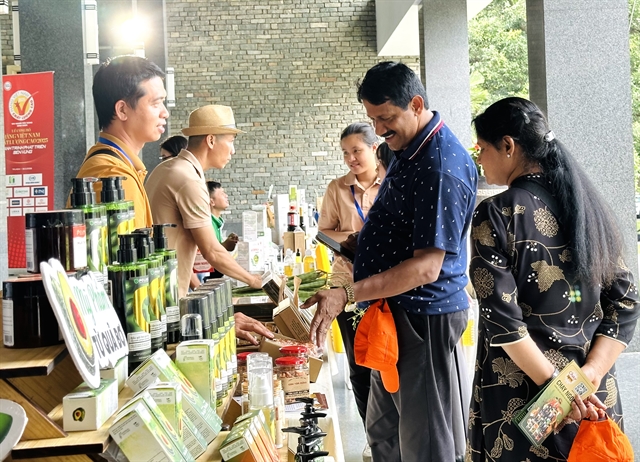Việt Nam is aggressively promoting growth, enhancing competitiveness, and fostering innovation, with major current and upcoming breakthrough policies poised to redefine the nation's approach to economic development, experts said at a seminar held in HCM City on March 25.

HCM CITY — Việt Nam is aggressively promoting growth, enhancing competitiveness, and fostering innovation, with major current and upcoming breakthrough policies poised to redefine the nation's approach to economic development, experts said at a seminar held in HCM City on March 25.
The seminar “Việt Nam’s Economic Outlook 2025 and Key Business Policies to Watch”, organised by the Business Association of High Quality Vietnamese Products, discussed the direction and implications of economic reforms.
Đậu Anh Tuấn, Deputy Secretary General and Head of the Legal Department of the Vietnam Chamber of Commerce and Industry (VCCI), said the Government’s Resolution No. 25 assigns specific growth targets to local authorities, placing substantial pressure on them.
The country aims for an 8 per cent growth rate and double-digit figures in the coming years.
“While this represents a considerable challenge, it also offers an opportunity for the country to achieve a strong breakthrough,” he said.
Meanwhile, major policy initiatives, such as Resolutions Nos. 57 and 193 and an upcoming resolution on the private sector, reflect a growing focus on science, technology, and private enterprises.
The country's total import-export turnover has reached nearly US$800 billion and is expected to surpass US$1 trillion, highlighting the country’s heavy reliance on global trade.
Additionally, foreign direct investment (FDI) inflows into the country have been highly positive over the past year.
In an open economy like Việt Nam, even a significant change in the international market can heavily impact the domestic economy.
“Therefore, businesses must be more proactive in managing risks and seizing opportunities presented by free trade agreements (FTAs), while improving adaptability and risk management capabilities,” Tuan said.
Moreover, as Việt Nam deepens its global integration, improving product standards, building brand credibility, and ensuring transparency across supply chains are no longer optional; they are essential requirements for Vietnamese enterprises.
This means that businesses should not only aim to satisfy domestic market demands but must also meet the strict standards of international markets, covering product quality, social responsibility, and sustainable development.

Đoàn Đình Mạnh Toàn, CEO of ASIF Foundation, highlighted research findings showing that consumers increasingly prefer to buy from companies that demonstrate strong social responsibility.
“This makes corporate social responsibility (CSR) a powerful tool to enhance brand reputation and long-term competitiveness,” he said.
At the same time, more investors are considering a company’s ESG (Environmental, Social, and Governance) strategy as a key factor in investment decisions, with many willing to divest from firms that fail to meet ESG standards.
Therefore, he said that businesses need to actively create sustainable social value by building business models that balance profitability with social goals that align well with emerging policies.
“In parallel, fostering ecosystems for collaboration and shared value among governments, non-profit organisations, and businesses is an effective strategy for shaping ESG-focused plans.”
Vũ Kim Hạnh, chairwoman of the Business Association of High-Quality Vietnamese Products, said that for nearly thirty years, the "High-Quality Vietnamese Goods" programme has remained committed to the two core principles embedded in its name: “Consumers” and “High Quality.”
It has been a long journey in which consumer trust in Vietnamese goods, combined with the persistent efforts of the association, has driven businesses to continuously improve product quality, contributing meaningfully to the country's economic development.
“Beyond building a supportive business ecosystem, the association has also actively promoted green transition initiatives, making it a central focus in recent years,” she said.
Through these efforts, the association continues to accompany enterprises on their path to sustainable development, aligning social responsibility with long-term competitiveness. — VNS





